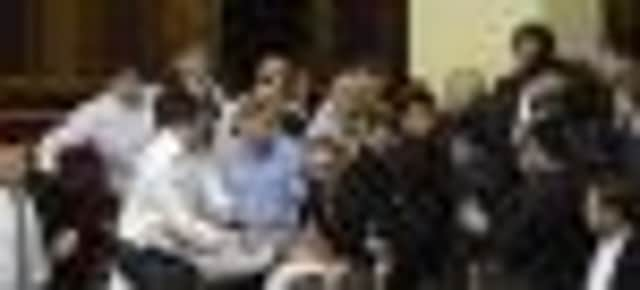In pictures: Vitali Klitschko side-steps mass brawl at Ukranian parliament


In a show of passion, rival Ukrainian politicians slugged it out during a vote to elect the country’s speaker.
But while opposition deputies – or MPs – and those from the country’s ruling party traded blows, Vitali Klitschko, leader of the liberal Udar (Punch) party and reigning WBC heavyweight champion, looked on.
Advertisement
Hide AdAdvertisement
Hide AdOne of the few men in the chamber not to get involved, the 6ft 7in boxer jokingly told reporters his punches would have been too dangerous.


“I understand many people want Klitschko to launch an offensive, but I would like to remind [them] that, for example, in the United States, a boxer’s fists are considered weapons and the fists of a world champion are considered nuclear weapons,” he said.
“We will not use these weapons for now.”
Led by president Viktor Yanukovych, the Party of the Regions secured a slim majority in October’s elections.
Yesterday’s parliamentary session descended into chaos when opposition politicians tried to physically block a vote on the ruling party’s nomination for the post of speaker.
Opposition figures swarmed around the rostrum when a vote on the appointment of Vladimir Rybak was about to be announced, clashing with a group of Regions deputies.
The opposition, which includes Udar, deputies loyal to jailed former premier Yulia Tymoshenko and nationalists from the far-right Svoboda, accuse the ruling coalition of trying to ram through voting despite violations of parliamentary rules.
Opposition lawmakers were angry at the fact some of their opponents continued the controversial practice of voting in place of their absent colleagues, despite a recent ban.
Yanukovych ally Volodymyr Rybak, a 66-year-old former mayor of the eastern city of Donetsk, interrupted his speech in frustration. “Esteemed deputies, let us calm down,” he said as the fight continued, but he was widely ignored.
Advertisement
Hide AdAdvertisement
Hide AdOnce the fight ended, Mr Rybak was elected speaker after the opposition refused to take part in the vote.
In equally rowdy scenes on Wednesday, opposition MPs paralysed the session by encircling the rostrum, sabotaging the ruling coalition’s plan to ease Mykola Azarov into a second term as prime minister.
Traditionally split between Ukrainian speakers in the west of the country and those in the east who speak Russian and seek closer ties with Moscow, Ukraine’s “Orange Revolution” in 2004 saw pro-western opposition leader Viktor Yushchenko win the presidency.
But attempts at democratic reform and moves towards Nato and European Union membership stalled amid infighting and divided public opinion.
While brawls in Ukraine’s parliament are by no means uncommon, it is not the only country where rival politicians have come to blows in recent years.
A disturbance in the Taiwanese parliament in 2010 saw two politicians end up in hospital after a fight that saw lawmakers throw things at one another and splash rivals with water.
In 2007, a mass fight broke out in the Bolivian parliament during a debate on whether or not to try judges on corruption charges.
Countries such as Argentina, India and Nigeria have also experienced parliamentary punch-ups in recent years.